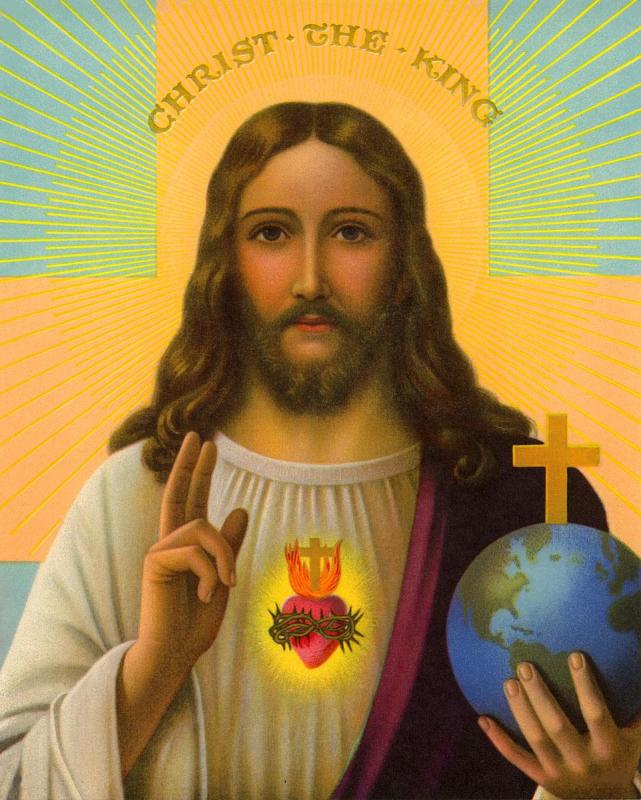
Solemnity of Christ the King
Welcome to the Solemnity of Christ the King. Happy Feast Day.
Today as we gather to celebrate the day, I would like to say something more about why Pope Pius XI instituted the Feast and why it is still relevant today. I will pick up some points from the Pope’s Encyclical Letter of December, 11 1925; Quas Primas —which introduced the Feast (Nos. 31, 32, 33).
Jesus Christ is Lord of the Universe.
The Pope introduces his Letter with the following words:
In the first Encyclical Letter …... We remember saying that (the) manifold evils in the world were due to the fact that the majority of men had thrust Jesus Christ and his holy law out of their lives; that these had no place either in private affairs or in politics: and we said further, that as long as individuals and states refused to submit to the rule of our Savior, there would be no really hopeful prospect of a lasting peace among nations. Men must look for the peace of Christ in the Kingdom of Christ….. (Quas Primas, No. 1)
He saw a problem, the governors and governed of this world were thrusting Jesus Christ out of their lives. The law of God no longer meant anything to them, it had no place in people’s private lives or in politics. Evils were multiplying in the world at an alarming rate. He wished to open the eyes of the world that they may see the needful; namely, that throwing Christ out of their lives leads to doom. So he wrote Quas Primas which instituted the feast of the Kingship of Christ and called upon the world to look for peace in the Kingdom of Christ. Christ out: meant more evils and Christ in: meant back to the way of peace.
The Pope expected that celebrating the Feast annually, would remind rulers of nations, that they too are bound to give public honor and obedience to Christ. He believed that they would be reminded that not all ends here on earth; Jesus Christ whom they throw out of their lives, despise, neglect and ignore, will be found as a just judge at the end of time, demanding that Nations answer for their actions. He will want to know how much freedom the State gave to the Church to carry out her mission in the world and how the same State took account of God’s commandments and Christian principles in making laws and administering justice.
He further hoped, that the Feast would be a reminder to everybody that the Church has the right to perfect freedom and immunity from the power of the State. When the Church is fulfilling her God given duty of teaching, ruling and guiding those who belong to the kingdom of Christ, she has a natural and inalienable right to perfect freedom and immunity from the power of the state and cannot be subject to any external power. The State is thus bound to give freedom to the agents of Evangelization as they carry out the mission.
It was his intended aim, that the faithful would gain strength and courage from the celebration of the feast, as they would annually be reminded that Christ must reign in their hearts, minds, wills, and bodies. It was his desire that this would lead the faithful to live their lives in accordance with the laws of God’s kingdom and receive full measure of good fruit, and counted by Christ good and faithful servants, they may be rendered partakers of eternal happiness and glory with him in his heavenly kingdom.
The relevance of the Feast today
Ninety two years since the institution of the Feast, the world still needs to be reminded that the way to lasting peace among nations is through submission to God’s law through Jesus Christ, Lord of the universe.
Unfortunately a good number of people today, as in 1925, are more interested in what profits them individually here and now. The individual self is becoming the only authority. Calling Christ Lord or King seems antiquated to some, because these are titles given to oppressive systems of governance. They don’t stop to reflect on the kingship of Christ whose kingdom is one of humility and service.
We hear him say: “You know that those who are recognized as rulers over the Gentiles lord it over them, and their great ones make their authority over them felt. But it shall not be so among you. Rather, whoever wishes to become great among you will be your servant; whoever wishes to be first among you will be the slave of all. For the Son of Man did not come to be served, but to serve, and to give his life as a ransom for many (Mark 10:42-45)”
The kingdom that Jesus Christ brings is a kingdom of justice, radical love, mercy, peace and forgiveness.
We therefore still find the celebration of the feast of Christ the King relevant today. It continues to remind us that in him we find answers to many of the questions we are ever struggling to answer when we are blindly pursuing the individualistic path that many are following. Humility, justice, love, mercy and forgiveness will lead us to true peace.
Sun 26, Nov 2017 04:11 am
